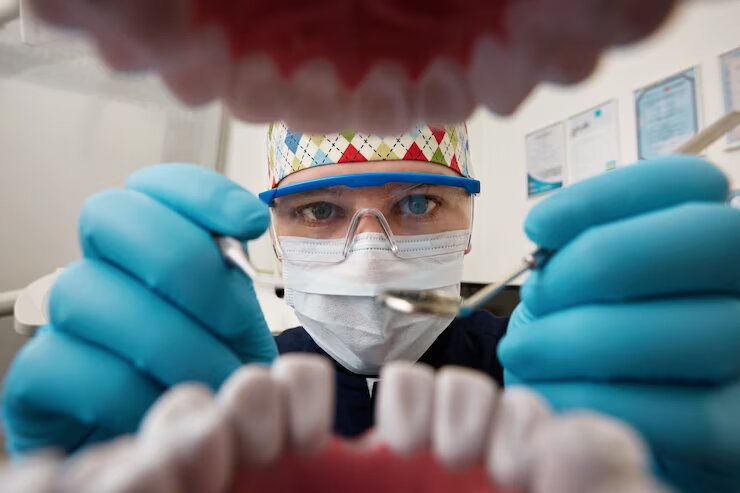With the aim to protect and improve the appearance of damaged or decayed teeth, dental crowns are a common dental restorative option. However, before undergoing any dental procedure, it's important to consider the pros and cons.
We will examine the advantages and potential drawbacks of receiving dental crowns in this article to help you determine if they are worth it for you.
What are Dental Crowns?
Dental crowns, commonly referred to as dental caps, are artificial restorations that are placed on top of weakened or broken teeth to strengthen, shape, size, and enhance their appearance. Our dentist in Vancouver creates crowns specifically to fit over the damaged tooth, completely encasing the visible area above the gum line.
Porcelain, ceramic, metal alloys (such as gold or silver), or a combination of materials can all be used to create dental crowns. The decision relies on elements such as the tooth's location, personal aesthetic preferences, and functional requirements. Each material has specific advantages and considerations.
Dental crowns are commonly used in various situations, including:
- Tooth Decay: A crown may be recommended to restore a tooth's structure and function when it has a significant cavity that cannot be effectively filled.
- Cracked or Fractured Teeth: A cracked or broken tooth can be strengthened and held together with a crown, preventing additional damage and even tooth loss.
- Root Canal Treatment: A crown is often attached to the healed tooth after root canal therapy, which involves extracting infected dental pulp, in order to preserve it and improve its aesthetics.
- Cosmetic Enhancements: The appearance of teeth that are excessively discolored, crooked, or have other cosmetic issues can be improved with crowns.
- Dental Implants: Dental implants, are titanium posts surgically inserted into the jawbone to replace missing tooth roots, include crowns as their visible component. To complete the restoration, the crown is secured to the implant.
The Process
Usually, receiving a dental crown entails a number of processes. Your dentist near you will first inspect the tooth to see if a crown is the best course of action. If so, they will clean out any decay or damage and reshape the tooth to make room for the crown. For creating a custom-made crown that fits perfectly, an imprint or digital scan of the prepared tooth and neighbouring teeth is required. A temporary crown may be used to cover the tooth in the meantime.
Once the permanent crown is completed, it is examined for aesthetics, fit, and colour. The crown will next be bonded to the prepared tooth by the dentist using dental cement or adhesive. To ensure an appropriate bite and alignment, they will make any required changes. Dental crowns in Vancouver can provide both practical and aesthetic benefits for many years with the right upkeep.
Pros of Getting Dental Crowns
Restoring Tooth Functionality
Damaged teeth can be properly functionally restored using dental crowns. They enable you to bite and chew correctly by giving weak or fractured teeth stability and strength.
Protection
With its complete coverage of a tooth's visible surface, dental crowns serve as a barrier of protection. By adding an additional line of protection, they can aid in preventing potential damage like fractures or deterioration.
Aesthetics
The visual appeal of crowns is enhanced because they are made to match the size, shape, and color of your natural teeth. For teeth that are severely discolored, irregularly shaped, or that have had root canal treatment, they can be extremely beneficial.
Durability
Crowns for teeth are known for their durability. They are a long-term, cost-effective alternative since they can last for many years with the right upkeep and care.
Versatility
Various dental problems, such as tooth decay, cracks, chipping, and even aesthetic flaws, can be treated with crowns. They are versatile solution that may be tailored to meet your unique requirements.
Cons of Getting Dental Crowns
Tooth Sensitivity
After receiving a crown, some individuals might experience temporary tooth sensitivity. Usually, this sensitivity goes away within a few days or weeks. However, in rare cases, it may persist or worsen, requiring further dental intervention.
Invasive Procedure
A significant portion of the natural tooth structure must be removed during the dental crown procedure. To make room for the crown, an irrevocable action is required. Although the procedure is often well accepted, it's essential to be informed of risks and repercussions that might occur.
Potential Allergic Reactions
Rarely, individuals may experience an allergic response to the ceramics or metal alloys used in dental crowns. If you have any allergies or sensitivities, it's essential to let your dentist know so that suitable materials can be used.
Cost
Dental crowns can be quite costly, particularly if you need multiple crowns or if your insurance isn't very comprehensive. However, many people believe they are a wise investment in their dental health given the longevity and the advantages they provide.
Conclusion
Based on your unique dental needs and circumstances, you must consider the advantages and disadvantages of getting dental crowns near you to determine if they are worthwhile. While they have a number of benefits, such as enhanced usefulness, protection, and aesthetics, it's vital to weigh any potential drawbacks, such as sensitivity, the procedure's invasiveness, potential allergies, and the associated expense.
If you want to know if dental crowns are the right option for you, it's essential to consult with your dentist. Your dental health may be evaluated, alternative treatments can be discussed if necessary, and they can help you make a well-informed decision that fits with your needs and goals. In order to ensure the effectiveness and durability of any dental restoration, including dental crowns, it is important to practice proper oral hygiene and have regular dental exams.


No comments yet